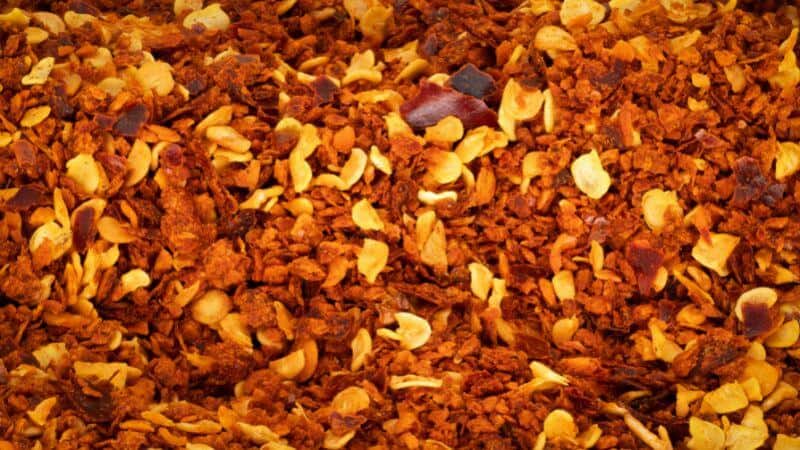If you’ve ever eaten something spicy and later spotted little red specks in your poop, you’re not alone! It’s actually quite common to see undigested red pepper flakes in stool.
But what causes those bright red flecks to make a cameo in your toilet bowl? And should their appearance concern you at all? Let’s break it down.
Seeing a sprinkling of red pepper bits simply means your body didn’t fully digest them before they exited. The tough outer skin of peppers resists breakdown during digestion. Dried pepper flakes are even harder to grind up.
Plus, the spicy capsaicin in peppers stimulates your gut to move things along faster. And the high fiber in peppers adds bulk to your poop. More volume means less time for thorough digestion.
So in most cases, a few red confetti specks are harmless and nothing to stress about. But large undigested chunks could indicate an underlying issue. We’ll explore the causes and solutions so you can get back to boring old brown bowel movements ASAP.
What Causes Red Pepper Flakes in Poop?
Finding red pepper flakes in your poop simply means your body wasn’t able to fully digest them before they exited your system. Here’s why that happens:
Pepper Skin is Tough to Break Down
The outer skin of peppers contains tough cell walls that are difficult for our digestive system to fully break down. So those shiny little flecks of red you see are actually pieces of pepper skin.
This is especially true for dried pepper flakes, which are even tougher than fresh peppers. The drying process causes the cell walls to harden and become extra challenging for your gut to grind up.
Peppers Stimulate the Digestive Tract
Spicy foods like red peppers contain a chemical called capsaicin. It’s what gives peppers their heat, but it can also irritate the lining of your intestines.
This irritation stimulates the gut to move things through more quickly. So your body has less time to fully digest red pepper flakes when capsaicin is speeding up the process.
High Fiber Content Adds Bulk
Peppers are packed with fiber, which is normally a good thing. But too much fiber acts like a bulking agent in your colon, absorbing water and adding volume to your poop.
More poop volume means those pepper flecks have to move through faster. Less time in your system equals less digestion of those hard-to-break-down pepper skins.
Is Seeing Red Pepper Flakes in Poop Normal?
Yep, it’s perfectly normal to see intact red pepper pieces in your stool occasionally. Unless you have an underlying gastrointestinal issue, like frequent diarrhea or constipation, a few red specks are nothing to worry about.
Your digestive system was designed to handle the skins and seeds of peppers without any problem. So don’t stress about the red confetti in your toilet bowl!
What If There’s A LOT of Red Pepper in My Poop?
Seeing a few tiny flakes is no biggie. But what if you’re passing entire chunks of red pepper in your stool? Or there’s so much red that your poop looks like a bowl of chili?
Large amounts of undigested red pepper could mean something isn’t working properly with your digestion. Here are some possible causes:
You Ate Too Many Peppers
Eating a huge quantity of peppers in one sitting can overwhelm your gut’s digestive capacity. The excess simply passes through without being fully broken down first.
Try scaling back on portion sizes of peppery foods. And avoid eating fiery dishes late at night when your digestion slows down.
Underlying Digestive Issues
Frequent diarrhea, constipation, gas, bloating, etc. can all affect how well your body digests red pepper flakes. Pay attention to any other symptoms along with the red flecks.
See your doctor if digestive troubles persist. They can check for underlying conditions like IBS, food intolerances, infections, etc.
Not Enough Fiber
Low fiber diets lead to slower GI transit times. So pepper pieces linger longer, resulting in more intact flakes in stool.
Aim for 25-30 grams of daily fiber from veggies, fruits, whole grains and legumes. Stay hydrated to keep things moving!
Tips to Reduce Seeing Red Pepper Flakes in Your Poop
While small amounts are no worry, you can take steps to further break down those hard-to-digest pepper pieces:
- Remove seeds and white membranes – They contain the highest concentration of tough cell walls.
- Chew peppers thoroughly – Mechanical breakdown by your teeth makes digestion easier.
- Add fat when cooking – A little oil helps break down cell walls much like chewing.
- Drink fluids – Water keeps the digestive tract lubricated and supports healthy motility.
- Eat yogurt – The probiotics support your gut microbiome for better digestion.
When to See Your Doctor About Red Pepper in Stool
You should make an appointment with your physician or gastroenterologist if:
- There are large undigested pieces of red pepper frequently in your stool
- Digestive symptoms like diarrhea, constipation or abdominal pain accompany the red flecks
- You see blood along with the pepper pieces
- Persistent issues with nutrient absorption or unexplained weight loss
Preventing Future Problems
Once your gut recovers from any irritation caused by red peppers, there are some things you can do to help prevent future digestive troubles:
- Moderate your intake – Don’t overdo it on portion sizes of spicy foods. Follow suggested serving sizes and avoid eating fiery dishes late at night when digestion slows.
- Pair with cooling foods – Have a cooling yogurt sauce, cucumber salad, or mint chutney alongside spicy meals to balance the heat.
- Remove membranes – Deseeding peppers helps lower the capsaicin content. Also remove the white pith and inner membranes which contain most of the heat.
- Consider reintroducing slowly – After a flare up, start with small amounts of milder peppers and work back up to hot varieties.
- Chew thoroughly – Take time to chew peppers well to mechanically break down those tough cell walls before swallowing.
- Stay hydrated – Drink plenty of fluids during and after eating spicy foods to aid digestion and keep bowels regular.
With some care and moderation, you can prevent those unpleasant pepper sightings in the toilet by helping your body properly break down and digest this fiery food.
The Takeaway on Red Pepper Flakes in Poop
Finding a few tiny red specks is harmless and perfectly normal. But large undigested pieces could indicate an underlying digestive problem that needs medical attention.
With proper digestion and moderating your red pepper intake, you’ll be back to plain old boring brown poops in no time!
Sources
- Livestrong: Hot Peppers & the Stomach
- Livestrong: Why Does My Stomach Hurt After Eating Bell Peppers?
- Livestrong: Worth the Burn? Why Experts Say Hot Peppers Should Be a Diet Staple
- Well + Good: Why Too Much Fiber Causes Digestive Problems
- PepperScale: The Hot Pepper List: 150+ Chilies Profiled
- Chili Pepper Madness: Should I Remove The Seeds Before Eating Or Cooking With Chili Peppers?





